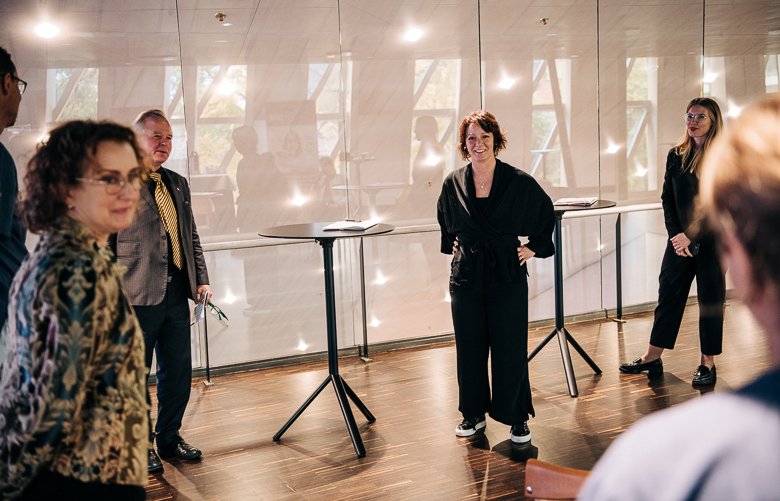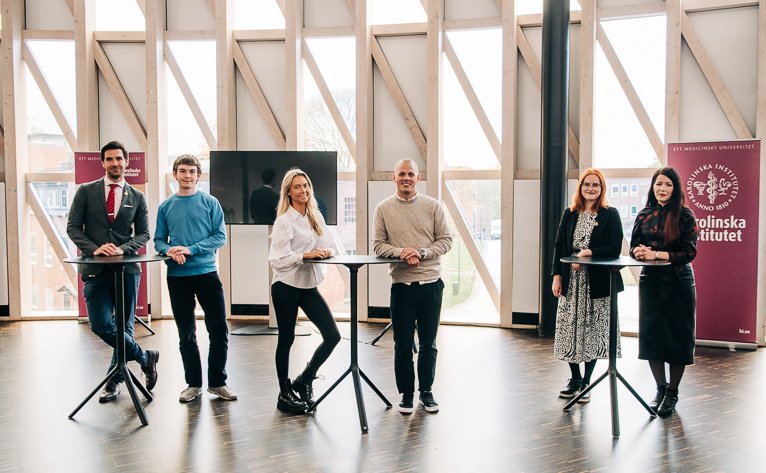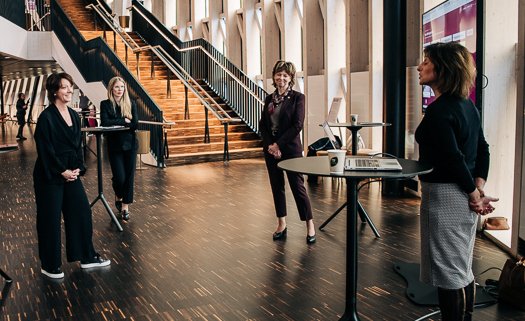Minister visited KI: impressed by KI’s adaptability

Matilda Ernkrans, minister for Higher Education and Research, visited KI on 23 October. She met students, faculty, researchers and the university management, who described how they had adapted to the ongoing pandemic.

“I’m greatly impressed by how you managed to adapt research to the pandemic, even more so by how quickly you managed to do it with teaching,” says Matilda Ernkrans, minister for Higher Education and Research.
Face to face with the students
Amongst those the minister devoted most time to during her visit, were students from KI’s student unions. During a face-to-face conversation, six students answered questions and had a chance to voice their opinions.
“She showed genuine interest in what we had to say and asked particular questions about the mental health of the students now during the pandemic, which has obviously hit some student groups harder than others,” says Jessica Härtell, chair of the Medical Students’ Association in Stockholm (MF).
It is the international students who are particularly affected, since they often lack personal networks and the pandemic has made it hard for them to make new friends.
“Since we’ve had to cancel so many student events, it’s made it even harder for people to meet and make the kind of contacts that can provide support in all aspects of life,” says Leo Ziegel (MF).
Many students also had a very stressful summer as they had to catch up on missed courses while doing full-time jobs.
Adapted teaching

The students made a point of how the digitalisation of their education has really been given a boost by the pandemic.
“For a long time, we’ve been wanting more flexible forms of teaching that can help students fit their studies into the rest of their lives more easily, and we’re hoping that this is the start of something new,” says Jesper Ruda, chair of the Student Union of Odontology (OF).
Several concrete examples of how teaching has been adapted to the pandemic were given by Annika Östman Wernerson, academic vice president of Higher Education, and Anna Pettersson, director of the physiotherapy programme.
There are new technical aides, such as digital notice boards, as well as additional material for students’ reading lists as a complement to distance teaching, not only in the form of recorded lectures but also practical instruction films in which teachers demonstrate different procedures using each other as models.
Such demonstrations have also been recorded by the students using family members or friends. And examinations have been supplemented by an online test.
“When it’s worked well, there have been adequate resources such as interactive distance tools and an ear for the students’ requests and suggestions,” says Puck Norell, vice chair of MF.
The pandemic also made possible a greater element of peer-to-peer work, both between students and between supervisors and teachers.
“We now really want the chance to develop and improve our methods and models so that we can eventually take more responsibility for lifelong learning,” says Professor Östman Wernerson.
A historic transformation
Minister Matilda Ernkrans also took the opportunity to meet union representatives and listen to a presentation of the Academic Specialist Centre. She also met the university management, led by KI president Ole Petter Ottersen for a more general overview of KI and its activities.
“We’re keen to show how KI quickly adapted its teaching and research and how seriously we’ve taken the ‘third mission’,” says Professor Ottersen. “It’s a historic transformation and the input of our students, teachers and researchers since the end of February has been actually quite remarkable.”
The Minister’s visit was very well-timed, he says:
“It’s both an extreme and crucial time for research and higher education. Mostly, of course, due to the challenges brought about by the pandemic, but we’ve also got an exciting time ahead of us with this autumn’s large research bill.”
